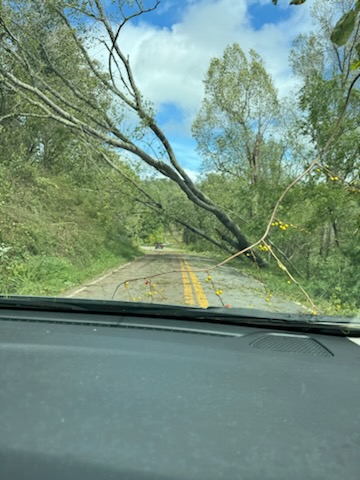“Floods are ‘acts of God,’ but flood losses are largely acts of man.” – Gilbert F. White
Report on hurricane Helene from a student:
“Last week the wife of a neighbor flew to NC with 6 of her female friends. They had rented an Air B&B and a car for the week, and their plan was to see sights and visit a restaurant owned by her cousin.
Their rented house was in a remote, heavily wooded area, but there were neighbors within walking distance along a shared driveway that emptied out on a two-lane county road. There is a small town about 4-miles away which had a single country store/gas station.
While out Thursday, they stopped at the small store for a few snacks for the following day – their plan was to remain local and live off chips and junk food until Friday night when they had reservations at the relative’s restaurant.
Having paid no attention to the news, they were shocked to be awoken by the storm rolling in.
Within a 6-hour time frame, they lost phone service, power, water, and were trapped from leaving by downed trees. By late morning, they were also out of food.
Hearing chainsaws running, they ventured outside and helped neighbors clear brush to get the driveway opened up. A dirty job which consumed hours, and calories. A local woman asked them if they had any food, and when she found out they didn’t, she made a large pot of soup for them and provided some sandwich fixings to go.
My neighbor’s wife works in the medical field and is a take charge kind of lady, and once the driveway was open she told her group that they were heading to town for food and information.
The trip was arduous. Downed power lines and trees were all over the road. When they finally arrived, the grocery store/gas station was closed due to the power outage. But they did learn that the storm had done damage all over the state, and the situation was growing dire by the hour due to flooding.
The wife then made the command decision that they were retrieving their possessions and heading to the airport.
After another couple of hours of dodging trees and power lines, along with a few detours, they made it – however, the airport was running on generator power and no flights were going in or out. Nor we’re any of the airport restaurants or shops open.
The wife then declared that this was now a road trip and they were driving the rental car home. Some in the group wanted to find a hotel, and she told them they were welcome to, but she was leaving. They all reluctantly followed.
Before leaving the airport she found a single rental car employee, and from him, with cash (electronic payments were down), purchased a paper road map of NC since their phones were still out of service, thus, no GPS.
They stopped for gas outside the airport and there was a limit of $30 per customer, and that was after waiting in line for 20-minutes. This occurred again at another station before they were finally topped off.
By this time Interstate 40 was destroyed, as well as a number of other routes. However, after a few detours they finally made their way over the Appalachians and eventually back to Chicago. Total time: 23-hours.
Had they not left when they did, they’d still be there, as the flood waters rose all day Saturday and Sunday.
…And none of their spouses would know if they were alive or dead!”
~end
Lessons
1. Personal Vehicles
When we must travel domestically, taking one’s own vehicle should always be considered since it allows transport of more gears and “might needs” than air travel can accommodate. There are certainly business, monetary, and time constraints that don’t allow for highway travel. But, as we saw this week, life comes at you fast – thus, having a vehicle stocked with food, water, medical, and defensive tools could someday make the life and death difference. The personal vehicle provides options!
2. Flying
When flying domestically, checking firearms is not the ordeal many think it is. With the exception of large airports in NY State, checking a firearm is generally painless. I’ve heard lots of excuses why people don’t want to check a gun, from expense of the extra bag to not wanting to wait for a bag on the other end, to not wanting to risk theft of a gun. All reasonable, but all are simply excuses. We’re either serious about our defense, or we’re not. The serious find a way.
When we check a bag, we can also add a serviceable medical kit and proper clothing for emergency. As well as a blade, or two, and OC spray.
3. Cash
Without electricity, nothing of importance works! There’s no way to use a credit or debit card, and there’s no way to spend Bitcoin. When disaster strikes, cash, at least in the short term, is king. We all need to get in the habit of carrying some, especially when traveling.
4. Communications
Most of us cannot absorb the extra expense of a satellite phone. They generally run at least $100 a month, plus the initial equipment investment. However, all things considered, they are far more affordable than ever. Consider it.
If that’s out of the question, check into the Bivy Stick. It’s a small device that allows one to text via satellite from most locations. Very affordable. And, when the cell towers go down, it still works.
Most point-to-point communications happening right now in the effected areas of North Carolina are via HAM radio. As much as it seems like the outdated hobby of 50-years ago, HAM is just as relevant as it ever when it comes to emergencies. Securing a basic license is far easier than it was 50-years ago, and you don’t even have to learn Morris Code. Something worth considering.
5. Batteries
Just about every device made these days is designed to recharge off of a USB port. That’s fine if one still has grid power or a nearby vehicle with a working battery and gas. I’m not suggesting to shun such tech – I’m suggesting to at least have a flashlight that powers from conventional batteries. And that goes quadruple for weapons lights.
Also, consider a portable solar panel for recharging phone batteries. Of course, with the NC storm, sunlight was vacant for days. Plan accordingly.
6. Paper/Hard Copy Maps.
I know it’s out of style and “boomer”, however we should all own paper maps of everywhere we plan on traveling, regardless of the ridicule we might have to endure. And, those maps should be in our vehicles! Granted, most under 45-years old don’t know how to read them, which, I suppose, is a just another symptom of a failing nation.
The Garman/DeLorme Atlas & Gazetteer are highly recommended. Many truck stops still sell the standard fold up maps, as well.
Maps can also be printed out and laminated.
7. Records
Don’t rely only on electronic storage! Don’t rely on a single hard copy in your own safe.
Having copies of important documents (wills, trust papers, powers of attorney, deeds, licenses, etc…) at a second location far from your own home is imperative! Copies of everything you need to prove ownership and legal standing should be locked the safe of a trusted other.
Add to it a list of contact phone numbers – who among us bothers to remember phone numbers anymore? When we lose our phone, and our cloud access, we’ll need to contact people. Memorizing the phone number of the trusted other is all we need to do, as they can provide us with all the others.
8. Decisive Action.
I can’t stress enough how important it is to be ahead of the crowd. Anytime the hair goes up on the back of your neck, listen to it and ACT! Don’t wait around hoping things will get better, or ignoring reality. As the saying goes, “it’s better to be a day early than a minute too late.”
As we tell our students, we don’t care what you do, just do something! Standing there with your feet in cement is going to get you killed, or worse.
Take charge and make a decision!
9. Societal Structure
We live in an amazing point in human history. There’s rarely a day that goes by that I don’t think about how lucky I am to live in a time of modern dentistry and next day delivery. But, it’s all fickle.
It requires a whole lot of resources, effort, people, and cooperation of complex systems to function. A hurricane, a virus, or even a long shoreman’s strike can quickly act as a reality check on our interdependence, and the system’s fragility.
It behooves us all to put at least a minor amount of time and resources into our own independence. Learning basic medical skills, reading books, and even just spending time outside away from electronic devices is a great start on development of the individual mindset.
For those who are starting homesteads, or going “off grid”, I salute you. Of course, I’m sure there are 1000’s of people in NC who had the same idea and now find themselves destitute. So, it’s not just about a place, or things, it’s about attitude and lifestyle. It’s having the mind, skills, and wherewithal to fight through problems and deploy solutions.
It’s critical thinking and decision making. It’s the exact opposite of what you see regularly displayed in the checkout line when the bagger places your ice cream next to the hot rotisserie chicken. It’s what we’re steadily losing as a nation.
10. Civil Unrest
.
In the regions of NC cut off from the outside world, looting is presently common place. There are otherwise good citizens who now have children that haven’t eaten in a week. Put yourself in their shoes – ask yourself: what wouldn’t I do to feed my starving child?
Well, it may be weeks or months before the smoke clears on this event and we get solid intel on how medieval it did, or didn’t, get. However, with 10’s of thousands of people now starving, and without water, it’s not hard to imagine.
Prepare accordingly.
Other Comments
The death toll and destruction from Helena is far worse that Katrina – best estimation is 10-times worse, maybe more. Of course, most mainstream media outlets don’t seem to care, nor does the Biden administration. When the earthquake/hurricane one-two punch hit Haiti in 2021, the US had National Guard there within 48-hours. As of today, nothing worth mentioning is moving, militarily, in SC, 5-days after the storm.
The best rescue and relief efforts are being made by private citizens, despite meddling politicians and some heavy handed, politically motivated local law enforcement who take offense to anyone who dares not ask their permission before saving the lives of fellow Americans.
Well, when discussing self-defense, the saying is: When seconds count, the police are only minutes away!
In the case of dying Americans: When minutes count, the government is sending money to Ukraine!
…and Israel. …and putting illegals up in hotels. …and lecturing us about “climate change.” …and making sure the military is receiving diversity training. …and arresting grandmothers for being within a block of the capital on January 6th. …and painting rainbows on crosswalks. …and “misplacing” 4-trillion in Pentagon/military funding. …and prosecuting their political enemies. …and, preventing Musk from deploying Starlink as part of the rural internet imitative which could have saved lives, here. and we spent 941-million in FEMA funds on illegals. so we’ll be out of money before we do jack for NC. and, and, and…
Anything but actually helping the people who pay their salaries.
This is the present day American condition.
“Trusting our intuition often saves us from disaster.” – Anne Wilson Schaef
If you’d like to assist in the NC relief effort, there are two ways I can recommend.
– On a national level, Operation Airdrop, is the organization on the ground and in the air directly saving lives in NC. They take donations – it goes mostly towards fuel as all of their pilots and ground workers are volunteers. They do GREAT work!
– In the Chicagoland area, there will be a semi-trailer in the parking lot of Walt’s Food Center, in Crete, IL, on Saturday (Oct 5, 7am-5pm), collecting food and supply donations. I personally know the people organizing this drive – all items donated will be driven to NC on Sunday and unloaded into the hands of locals in need.
Canned goods, medical supplies, TP, garbage bags, plastic flatware, bleach, soap, bath towels, blankets, power bars, batteries, baby food, diapers, baby formula, and canned pet foods, are all accepted. Please, no perishables, or food stuffs that can be crushed or broken in shipping.





